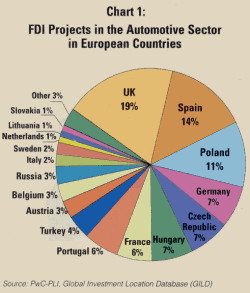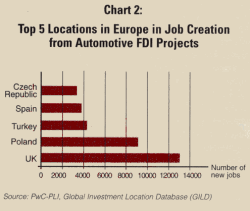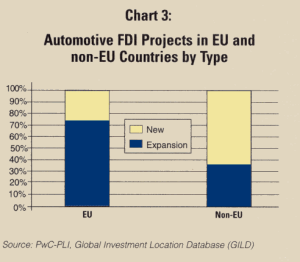
Eastern Europe is the main beneficiary of foreign direct investment (FDI) in Europe’s automotive sector, according to analysis from PricewaterhouseCoopers-Plant Location International (PwC-PLI), Brussels, developer of the Global Investment Location Database (GILD). “In terms of greenfield FDI projects in the automotive sector, non-European Union (EU) countries have attracted 3.5 times more projects than EU countries since 2000,” say Henry Loewendahl, senior consultant, and Roel Spee, director, of PwC-PLI (see chart 1). However, they add, the U.K. still remains the leading location in Europe for automotive FDI (see chart 2). This reflects the fact that the vast majority of the U.K. auto industry is foreign-owned, so reinvestment is considered FDI, whereas BMW’s recent investments in Eastern Germany would not.
“The U.K.’s first mover advantage in attracting the pan-European manufacturing operations of Japanese companies in the 1980s has also been a key advantage for attracting automotive FDI,” note the consultants. “Unlike Ford and General Motors, Honda, Nissan and Toyota have limited operations spread across Europe, giving less opportunity for new investment being diverted from the U.K. However, the major new plants will go outside of the U.K., such as the planned plant of the discussed Peugeot-Toyota joint venture, which is likely to be set up in Central or Eastern Europe.”

Investments in Western and Eastern Europe differ markedly, the GILD data reveals (see chart 3). “In the EU, three quarters of FDI projects in 2001 are expansions, while in non-EU countries, over 60 percent of FDI projects are greenfield,” say Loewendahl and Spee. “Central and Eastern Europe will continue to attract the greenfield final manufacturing plants and a growing number of their suppliers,” they predict. “Poland, the Czech Republic and Hungary have the most advantage in their combination of low costs, large and growing domestic markets, high skills and prospects of EU membership. However, wages are rising rapidly in the major economic areas in these countries, and tightness in the labor market is quickly increasing.” Shifts in FDI to still lower-cost locations, such as Romania, will likely follow an expansion of the EU.

For more information on PwC-Plant Location International’s GILD database, contact:
Roel Spee
(roel.spee@be.pwcglobal.com) or
Henry Loewendahl
(henry.loewendahl@be.pwcglobal.com)
Related article: “BMW Leads the Auto Pack in European Investment”
